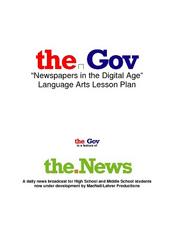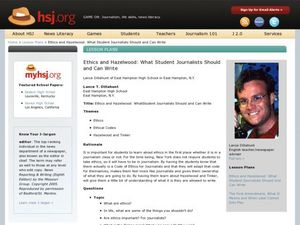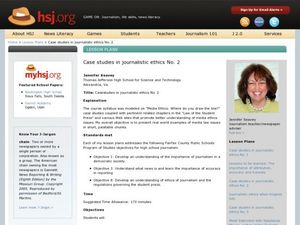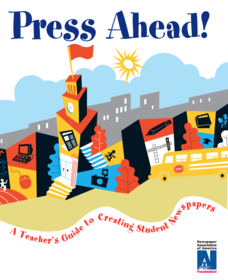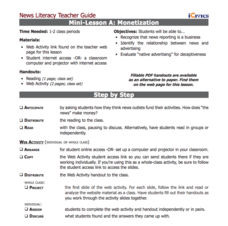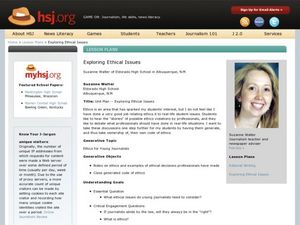Madison Public Schools
Journalism
Whether you are teaching a newspaper unit in language arts, covering the First Amendment and censorship in social studies, or focusing on writing ethics in journalism, a unit based on the foundations of journalism would be an excellent...
Curated OER
Case Studies in Journalistic Ethics - Number 3
Learners investigate ethical decision making when using photos in journalism. In this ethics in journalism lesson plan, students read about the ethical use of images in media, discuss recent controversial photos, and look at online case...
News Literacy Project
News Goggles: Conflicts of Interest in News Reports
Nineteen slides use the story of Chris Cuomo of CNN and his refusal to discuss his brother, New York governor Andrew's political troubles, to inform viewers about the idea of conflict of interest in journalism.
iCivics
Lesson 1: Journalism
Extra! Extra! Do your pupils know what it takes to be a good journalist? Young news hounds explore the world of journalism through a series of activities that focus on ethical reporting. Learners read, evaluate, and investigate popular...
Pulitzer Center
The Paradise Papers: A Lesson in Investigative Journalism
The Paradise Papers, a year-long research project from the International Consortium of Investigative Journalism (ICIJ) exposed how political leaders, business people, and wealthy individuals used offshore entities to avoid taxes and hide...
News Literacy Project
News Goggles: Quotes in News Reports
To quote or paraphrase? That is the question examined by a 29-slide presentation on the importance of including direct quotes in news reporting.
Newseum
Media Ethics: Fairness Formula Starts With Accuracy
As part of a study of media ethics, young journalists apply a fairness formula to news reports. They look at accuracy, balance, completeness, detachment, and ethics to determine if the reporting is fair.
Newseum
Photo Ethics: Diversity
With the advent of photo manipulation software, it is possible to digitally edit a photograph in a way that is virtually undetectable. The question asked of young journalists in this lesson is whether such manipulation is ethical. Groups...
Benjamin Franklin Tercentenary
Franklin’s Fair Hand American Journalism
Scholars know him for his role in the American Revolution, but Ben Franklin was also a journalist and printer. Learners investigate his standards for what was fit to print using primary sources—including writings where Franklin explains...
Curated OER
Newspapers in the Digital Age
Is journalism more or less reliable with the influx of Internet sources? Learners investigate the issues of freedom of speech, journalistic ethics, and social responsibility in the age of Twitter and Facebook. After examining the...
American Press Institute
In the Newsroom: The Fairness Formula
Reporting the news is easy, right? Think again! Show young scholars the difficult choices journalists make every day through a lesson that includes reading, writing, and discussion elements. Individuals compare the language and sources...
Media Smarts
You Be the Editor
Look at different case studies to discuss the ethics of journalism. Twelve real-life events are written up and your learners get to be the editors. Encourage your class to think about the implications of publishing decisions. After each...
Newseum
Journalists Code of Ethics
Journalists are supposed to adhere to a Code of Ethics. To determine the degree to which reporters follow this code, individuals select three recent stories with photographs from newspapers, magazines, online news sites, or television...
News Literacy Project
News Goggles: Corrections and Clarifications: Accuracy and Correcting the Record
Accuracy and fairness are key principles in journalism. It is the responsibility of reputable news organizations to correct their stories when new information is found. Viewers learn to spot these corrections and clarifications through a...
Curated OER
Plagiarism in the Real World
How would you feel if someone plagiarized your work? After class members turn in an assigned newspaper article, you rewrite the piece using elements of their writing. Then you claim you will be selling the story and that you will profit...
Curated OER
Ethics and Hazelwood: What Journalists Should and Can Write
Students explore the code of ethics in journalism. In this journalism ethics lesson, students use Hazelwood and Tinker to explore journalism ethics. Students compare ethics of journalists and pirates, read a related article, write their...
Newseum
Photo Ethics: What Is Newsworthy?
Do not try this at home! At school! Or any other place! Groups of young journalists discuss the ethics of publishing photos of school peers performing dangerous stunts. They share their decision with the class and explain their reasoning.
PBS
Journalism in War Time: What Does the Public Need to Know?
A viewing of the documentary War Feels Like War, launches an exploration of the importance of accurate and comprehensive war reporting. Groups investigate various news agencies and assess the factors that influence their stories. A...
Curated OER
Case Studies in Journalistic Ethics No. 2
Learners use texts on media ethics and various Web sites to explore real world examples of media law issues. For this media ethics lesson, students examine the Food Lion case using a transcript from the court of appeals session and...
Curated OER
Forming a Code of Ethics
Students discuss and create a code of ethics for their student newspaper.
Curated OER
Teaching Ethical Situations
Learners use journalism ethics standards to learn how to write ethically correct news stories. In this journalism and ethics lesson, learners review journalism standards for ethics. Learners use the standards as they analyze example...
Newspaper Association of America
Press Ahead!
Give class members some great news! A media unit teaches individuals about ethics, parts of a newspaper, business writing, photojournalism, and more topics that have to do with the press. Full of material for a variety of learners,...
iCivics
Mini Lesson A: Monetization
Advertising is everywhere! Does your class know that their attention span is for sale, even when they're watching a simple news story? The second installment in a five-part series from iCivics examines the relationship between news...
Curated OER
Exploring Ethical Issues
Learners learn about ethical issues and its connection to journalism. Students examine examples of ethical issues some journalists have faced. in small groups, learners collaborate to write a code of ethics for their school newspaper....











